The 2020 Mac Mini Unleashed: Putting Apple Silicon M1 To The Test
by Andrei Frumusanu on November 17, 2020 9:00 AM ESTBenchmarks: Whatever Is Available
As we’ve had very little time with the Mac mini, and the fact that this not only is a macOS system, but a new Arm64-based macOS system, our usual benchmark choices that we tend to use aren’t really available to us. We’ve made due with a assortment of available tests at the time of the launch to give us a rough idea of the performance:
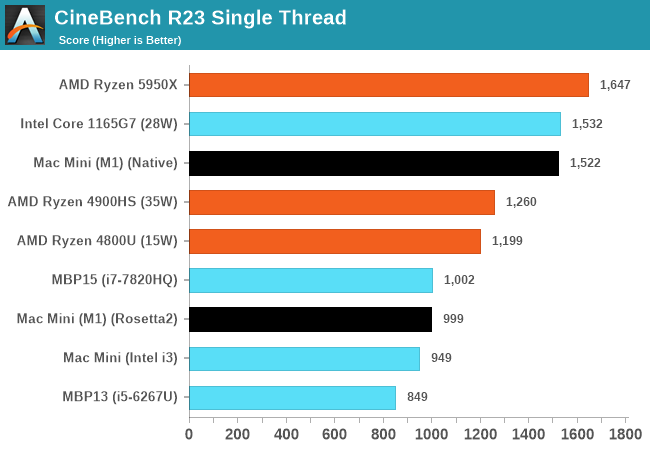
One particular benchmark that sees the first light of day on macOS as well as Apple Silicon is Cinebench. In this first-time view of the popular Cinema4D based benchmark, we see the Apple M1 toe-to-toe with the best-performing x86 CPUs on the market, vastly outperforming past Apple iterations of Intel silicon. The M1 here loses out to Zen3 and Tiger Lake CPUs, which still seem to have an advantage, although we’re not sure of the microarchitectural characteristics of the new benchmark.
What’s notable is the performance of the Rosetta2 run of the benchmark when in x86 mode, which is not only able to keep up with past Mac iterations but still also beat them.
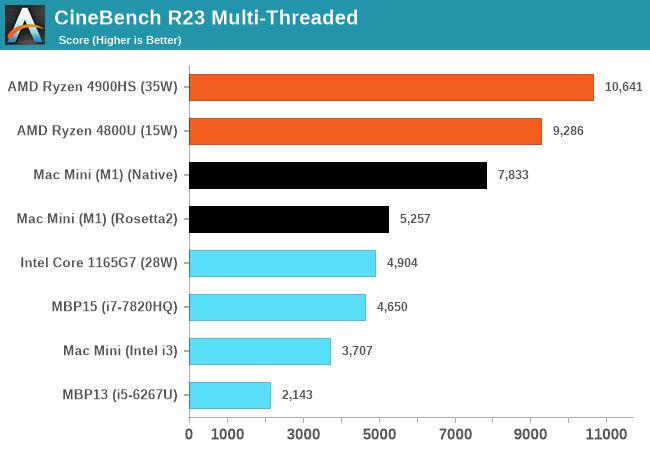
In the multi-threaded R23 runs, the M1 absolutely dominates past Macs with similar low-power CPUs. Just as of note, we’re trying to gather more data on other systems as we have access to them, and expand the graph in further updates of the article past publishing.
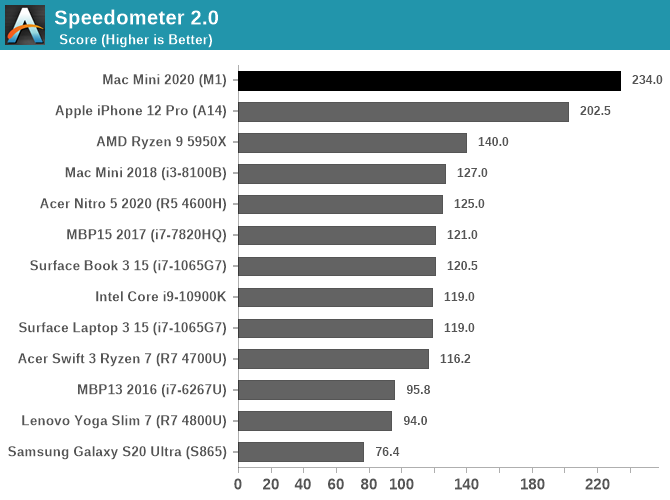
In browser-benchmarks we’ve known Apple’s CPUs to very much dominate across the landscape, but there were doubts as to whether this was due to the CPUs themselves in the iPhone or rather just the browsers and browser engines. Now running on macOS and desktop Safari, being able to compare data to other Intel Mac systems, we can come to the conclusion that the performance advantage is due to Apple’s CPU designs.
Web-browsing performance seems to be an extremely high priority for Apple’s CPU, and this makes sense as it’s the killer workload for mobile SoCs and the workload that one uses the most in everyday life.
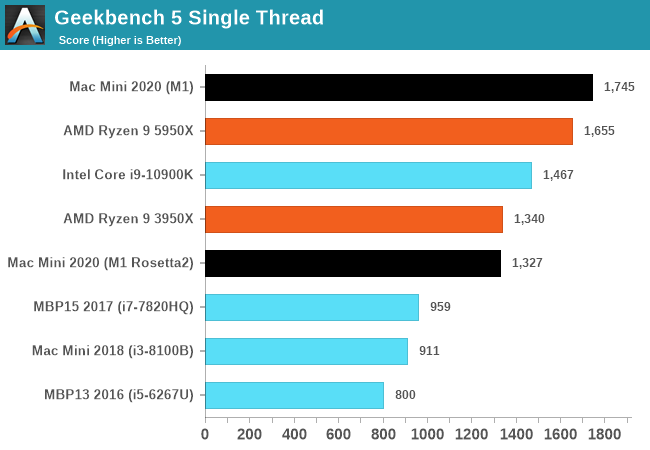
In Geekbench 5, the M1 does again extremely well as it actually takes the lead in our performance figures. Even when running in x86 compatibility mode, the M1 is able to match the top single-threaded performance of last generation’s high-end CPUs, and vastly exceed that of past iterations of the Mac mini and past Macbooks.
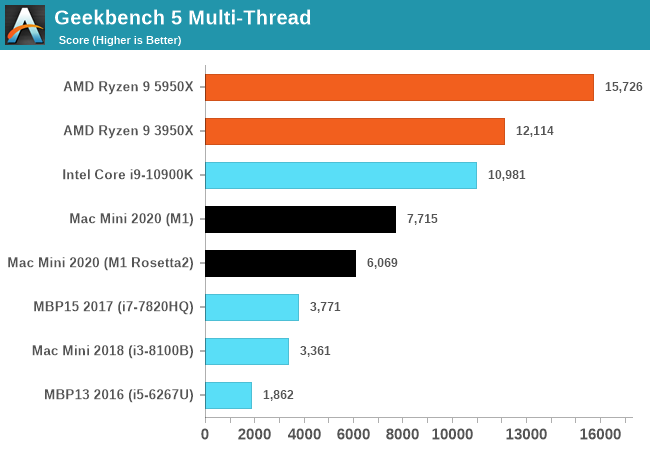
Multi-threaded performance is a matter of core-count and power efficiency of a design. The M1 here demolishes a 2017 15-inch Macbook Pro with an Intel i7-7820HQ with 4 cores and 8 threads, posting over double the score. We’ll be adding more data-points as we collect them.


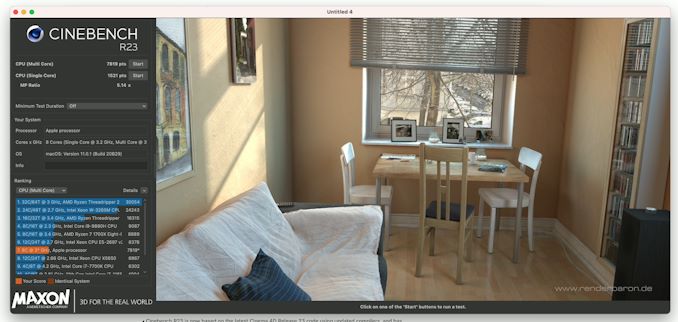








682 Comments
View All Comments
Arnulf - Wednesday, November 18, 2020 - link
"also seeing 4x Thunder efficiency cores at 2064MHz"Thunder or Icestorm?
realbabilu - Wednesday, November 18, 2020 - link
Andrei, could please type on terminal: sysctl -a | grep machdep.cpu.features. To see this cpu features?damianrobertjones - Wednesday, November 18, 2020 - link
...2031 - Apple moves to Intel processors.TouchdownTom9 - Wednesday, November 18, 2020 - link
Seems like Apple punched out a processor that matches Tiger lake in single thread perf while also doubling battery life and outperforming TGL in multithread performance. Very impressive stuff for a first go at a laptop /desktop class chip. While also being in the mac mini, this is clearly still a laptop class chip. Will be very interesting to know how much of the benefits are being driven by the 5nm node. Will be a very interesting comparison to compare to Zen 3 laptop parts when they arrive in Q1. Also will be interesting to see how it will compare (or the M2 chips) when all of them are on the 5nm nodes.Kuhar - Wednesday, November 18, 2020 - link
Exactly as I predicted in my comment on previous article on M1 CPU. It is very good, but far from being the best. From graphs we can see that in quite a few scenarios even 1 year old AMD Ryzen 4800U (@15 watts) kicks M1 right out of the field. And using Rosetta in some scenarios is around 40% handicap. Too much hype on your side Andrei - I would like to see same test with Zen3 U-series Ryzen (when available ofc). I am sure Ryzen will surprise you.TEAMSWITCHER - Wednesday, November 18, 2020 - link
I think the next couple of iterations on Apple's M family of processors will tell the tale. How does the Professional M1 silicon (for the 16" MacBook Pro, iMac, and Mac Pro) perform - if it exists at all? And how will the second generation (M3 Processors) perform compared, and how soon will Apple have them ready? Finally, will AMD be able to keep Apple's pace. Apple is far more diversified company, with the deepest pockets, and customers with deep pockets.Nicon0s - Sunday, November 29, 2020 - link
"Finally, will AMD be able to keep Apple's pace. "Undoubtedly, Yes.
AMD is actually more diversified in the context of the computing world and have access to way more market overall than apple. Just now the latest generation consoles have been launched and both use semi custom AMD designs. The race is not over anyway, AMD and Intel will continue to improve year after year and they still have in their pockets the majority of the computer market. Also I think Apple update cycle for their chips will be slower than AMD's anyway.
Ppietra - Monday, November 30, 2020 - link
It depends in what you consider computing. Apple products scale from smartwatches to workstations and all of them will have Apple SoC. Apple doesn’t have a console yet but there are strong rumours that it will have one in the near future. And considering all Apple products, it sells more processors through its products than AMD.Apple update cycle is already known. 1 new CPU core every year and always using the latest fabrication process, ahead of AMD.
zodiacfml - Wednesday, November 18, 2020 - link
What is the power consumption in the Cinebench MT run?EthiaW - Wednesday, November 18, 2020 - link
Intel can stay competitive in the laptop market by offering a 8-core TigerLake at 25W TDP, at least in the next year. However what's going to happen to them thereafter is unpredictable.